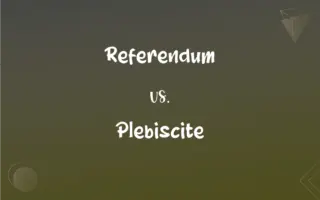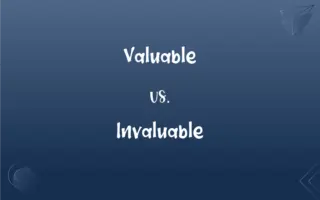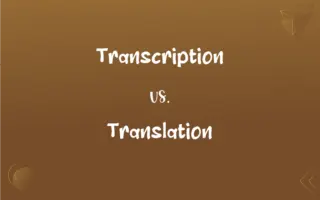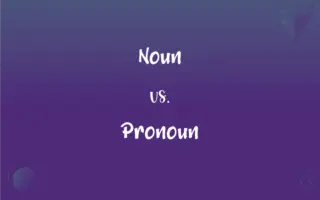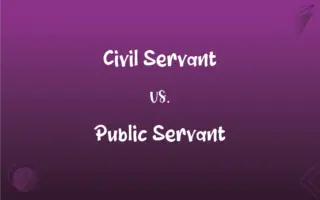Bill vs. Voucher: What's the Difference?
Edited by Janet White || By Harlon Moss || Published on December 25, 2023
A bill is a formal statement of charges or costs, while a voucher is a document serving as evidence for a transaction or entitlement.

Key Differences
A bill typically represents a request for payment for goods or services provided, showing itemized charges and the total amount due. In contrast, a voucher serves as proof of a right to a discount or service, often used in transactions as evidence for an exchange or redemption.
Bills are commonly issued after services are rendered or products are delivered, detailing the financial obligations of the buyer. Vouchers, however, are generally issued beforehand, offering a future benefit, like a discount or a specific entitlement, usable at the time of purchase or service.
In business, a bill is often a part of the accounts receivable process, where it signifies money owed to the issuer. A voucher, conversely, is used in accounting to authenticate transactions, acting as an internal control mechanism for expenses and reimbursements.
A bill is direct in its purpose: to inform the recipient of the amount owed. Vouchers, on the other hand, can be versatile, representing different forms of value such as gift vouchers, discount vouchers, or reimbursement vouchers, each with specific conditions and uses.
Bills are typically unilateral, requiring action (payment) from the recipient, while vouchers are more of a mutual tool, offering benefits to the holder while also serving organizational purposes like promotional strategies or financial record-keeping.
ADVERTISEMENT
Comparison Chart
Definition
A document requesting payment
A document proving entitlement
Usage
Post-service or product delivery
Pre-transaction for benefits
Financial Role
Indicates money owed
Represents value or entitlement
Variety
Mostly uniform, itemizing costs
Diverse types (gift, discount, etc.)
Interaction
Requires payment action
Offers benefits, requires redemption
ADVERTISEMENT
Bill and Voucher Definitions
Bill
Legislative Proposal.
The senator introduced a new bill in Congress.
Voucher
Payment Document.
He used a voucher to pay for his groceries.
Bill
Invoice.
The electric bill arrived in the mail today.
Voucher
Gift Certificate.
She gifted him a bookstore voucher.
Bill
Legal Document.
The lawyer prepared the bill for her services.
Voucher
Proof of Transaction.
The voucher confirmed her hotel booking.
Bill
Banknote.
He paid with a twenty-dollar bill.
Voucher
Reimbursement Slip.
Employees submit travel vouchers for expenses.
Bill
Bird's Beak.
The pelican scooped fish up with its bill.
Voucher
Discount Coupon.
They used a voucher for a free meal.
Bill
An itemized list or statement of fees or charges.
Voucher
A piece of substantiating evidence; a proof.
Bill
A statement or list of particulars, such as a theater program or menu.
Voucher
A written record of expenditure, disbursement, or completed transaction.
FAQs
How is a bill used in legislation?
As a proposal for new laws or amendments.
What is a bill?
A document requesting payment for goods or services.
Do bills show itemized costs?
Yes, they usually detail individual charges.
Is a bill legally binding?
It can be, especially in contractual agreements.
Can vouchers be exchanged for cash?
Typically, no, they exchange for specific goods or services.
What happens if a bill is unpaid?
It can lead to legal action or credit score impact.
What types of vouchers exist?
Gift, discount, travel, and reimbursement, among others.
What is a voucher?
A document evidencing entitlement or proof of a transaction.
How does a gift voucher work?
It acts as a prepaid token for purchases at specified places.
Can anyone use a voucher?
If transferable, yes; otherwise, only the named individual.
Are vouchers transferable?
Depends on their terms; some are, others are not.
Who issues a bill?
Service providers, sellers, or creditors.
What's the purpose of a discount voucher?
To offer a reduced price on goods or services.
Can a bill be electronic?
Yes, e-bills are common in digital transactions.
Are bills used in accounting?
Yes, as part of tracking receivables and expenses.
What is the difference between a bill and an invoice?
They are often used interchangeably, but invoices are more detailed.
Is a voucher a form of currency?
Not traditional currency, but it represents a value.
Are vouchers taxable?
Depends on the type and use; some may be subject to taxes.
Can a bill be negotiated?
Sometimes, especially in business or medical services.
Do vouchers expire?
Many have expiration dates or terms of use.
About Author
Written by
Harlon MossHarlon is a seasoned quality moderator and accomplished content writer for Difference Wiki. An alumnus of the prestigious University of California, he earned his degree in Computer Science. Leveraging his academic background, Harlon brings a meticulous and informed perspective to his work, ensuring content accuracy and excellence.
Edited by
Janet WhiteJanet White has been an esteemed writer and blogger for Difference Wiki. Holding a Master's degree in Science and Medical Journalism from the prestigious Boston University, she has consistently demonstrated her expertise and passion for her field. When she's not immersed in her work, Janet relishes her time exercising, delving into a good book, and cherishing moments with friends and family.



